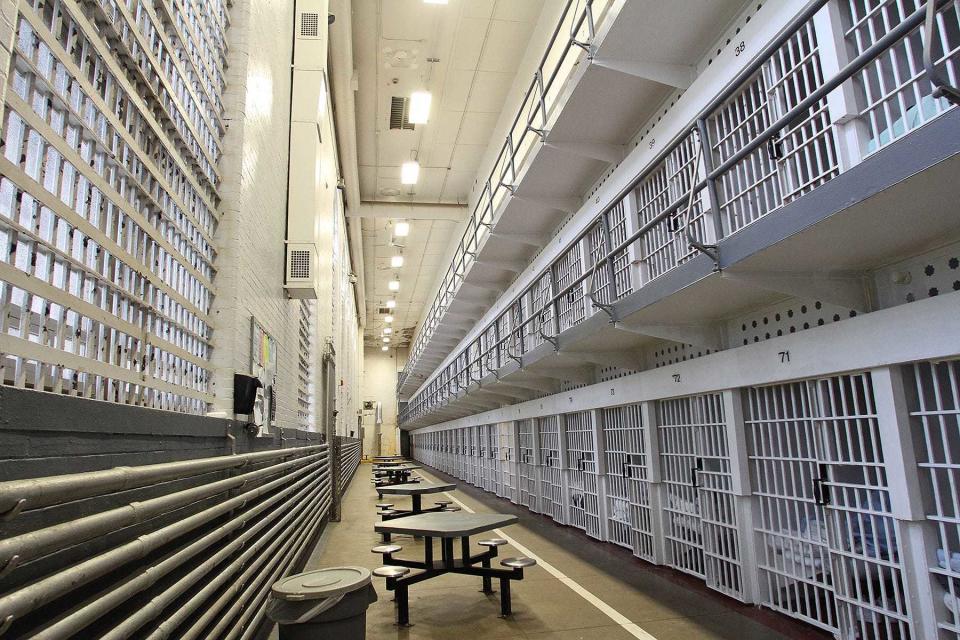He wants to wear an Apache headband in prison, and he's suing the state to do it.
A Tiverton man serving a life sentence at the state Adult Correctional Institutions is suing corrections administrators over their refusal to allow him to wear an Apache headband in keeping with the traditions he says he sincerely believes and was taught as a child.
The Rhode Island American Civil Liberties Union, with Roger Williams University School of Law Prisoners’ Rights Litigation Clinic, is suing the state Department of Corrections and its leaders in U.S. District Court on behalf of 59-year-old Wolf Pawochawog-Mequinosh.

What is the lawsuit about?
Pawochawog-Mequinosh identifies as a Native American shaman, also known as a medicine man, and says he was taught his religious practices and traditions by his grandfather, an enrolled member of the White Mountain Apache Tribe, according to the complaint.
Apache men traditionally wear cloth headbands 2 to 3 inches wide that tie in the back, and Pawochawog-Mequinosh believes that wearing one would express his faith and unity with the tribe and spirits, the suit says.
The lawsuit notes that corrections officials allow Muslim and Jewish prisoners to wear kufis and yarmulkes, and that Native American headbands are recognized as a religious item by the U.S. Bureau of Prisons. In 2016, U.S. District Court Judge William E. Smith ordered the Adult Correctional Institutions to allow an inmate who is a Sunni Muslim to wear his kufi in the exercise yard after the man sued.
The lawsuit, filed by Jared Goldstein, director of the RWU Law Prisoners’ Rights Litigation Clinic, and ACLU cooperating lawyer Lynette Labinger, argues that RIDOC's refusal to allow Pawochawog-Mequinosh to wear an Apache headband, along with its policy dictating which religious beliefs and practices align with his religious designation, violates his rights under the Religious Land Use and Institutionalized Persons Act, a federal law designed to protect the religious freedom of incarcerated individuals.
Pawochawog-Mequinosh is asking the court to order corrections officials to allow him to obtain and wear a headband without having to give up his use of rune stones and tarot cards, and allow him to participate in solstice events, which he argues are also in keeping with his religious beliefs.
He also seeks an order directing the department to revise its policies to allow individuals whose religious beliefs and practices do not fit within existing religious designations to exercise their sincere religious beliefs and practices.
“I just want to be able to practice my religion and to be able to use the artifacts for my religion without unjustified restrictions, like other religions are permitted to do. I don’t feel that this is too much to ask for,” Pawochawog-Mequinosh said in a statement.
'All inmates have the right to freely exercise their religious beliefs'
Corrections spokesman J.R. Ventura said that all inmates have the right to freely exercise their religious beliefs and liberty of worship, per policy, but that the exercise of this right may be restricted for legitimate security reasons.
“People’s safety is the top priority here. ... As for this particular matter, we just became aware of the lawsuit, and we are looking into it,” Ventura said in a statement.
He emphasized that the prisons accommodate numerous forms of worship and religious practices, such as dietary preferences, religious services, personal contact with accredited representatives of their faith, and more.
More: 'Denial of basic treatment': Judge lets medical malpractice suit against ACI move forward
Denial of repeated requests
In 2021, Pawochawog-Mequinosh, 59, filed a petition in state Superior Court to change his name from Brian K. Brownell to express his Apache heritage and faith. He said an Apache elder gave him the name Pawochawog-Mequinosh as a child. The petition was granted by Judge Brian Van Couyghen a year later.
Pawochawog-Mequinosh is serving a life term in medium security after being convicted of raping two women he knew.
The lawsuit traces Pawochawog-Mequinosh’s repeated requests to be allowed to wear a headband. He was advised at one point that he would need to change his religious designation in the system from Pagan/Wiccan to other, but that in doing so he would no longer be able to attend solstice services or keep his rune stones and tarot cards.
The lawsuit notes that the corrections system does not include a religious designation for adherents of Native American religious traditions, and the designation chosen “determines the religious observances [prisoners] will be allowed to attend and the religious items they will be allowed to obtain.”
“This should be a simple case. DOC has no reason to treat a Native American who wants to wear a headband to express his religious faith any differently than it treats Muslims and Jews who want to wear kufis and yarmulkes to express their faith,” Goldstein said in a statement. “DOC needs to change its policies that put all incarcerated people into specific religious categories and that makes no allowances for people like Wolf who don’t fit into these categories.”
This article originally appeared on The Providence Journal: Rhode Island man says prison discriminates against his Native American religion

